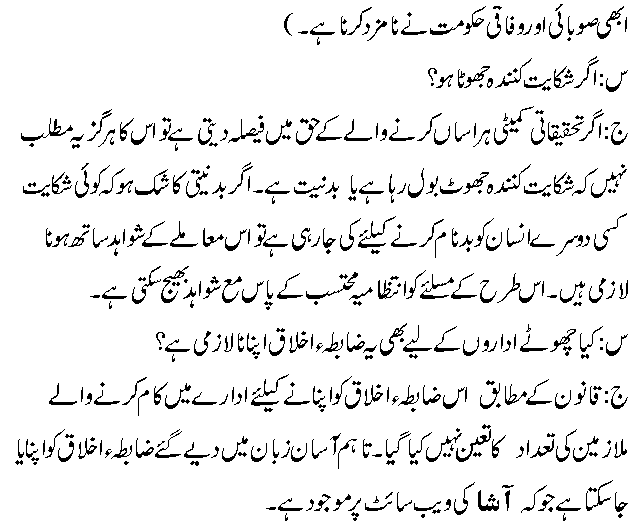|
Read Questions in English below, or
here in
Urdu:
Q: The law prescribes
that every organization adopt the code but how
do we go about doing it?
A: Step by step instructions on how to
comply with the law. (see
here)
Q: For public sector organizations, what
level should an inquiry committee cater to?
A: The Federal and Provincial Ministries
will have their own committees, each department,
semi-autonomous and autonomous bodies a linked
to a ministry should have their own committee.
The Ministries plus departments can decide to
have the committees at the district level if
necessary.
The Ministry of Education will send instructions
to each educational institution under it to form
their own committee; similarly the Ministry of
Health will have a committee constituted at
every hospital plus medical facility under it.
Q: What if an organization cannot
identify three people for the Inquiry Committee?
A: The management can always co-opt one
or more members from outside the organization.
This could be from any civil society
organization, union councillor or any other
respectable community member.
Q: What if a complainant doesn’t trust
the committee members or the management?
A: In such circumstances a complainant
can directly go to an Ombudsperson (to be set up
soon by the Federal and Provincial Governments).
Q: What if a Complainant is lying?
A: If the Inquiry Committee decides in
favour of the alleged harasser it doesn’t mean
that complainant is lying and this alone should
not constitute mala fide intentions. There has
to be clear evidence of fabrications with the
intentions of defaming the other in order for it
to be considered mala fide. In that case the
management should refer the case, with evidence,
to the Ombudsperson.
Q: Is it necessary for small organization
also to adopt the code?
A: Even though the law does not specify
any minimum number of employees that is required
to adopt the code, however smaller organizations
can adopt a simplified version of this code
given on the “Home”
page of AASHA’s
web site.
Q: What is the role of the focal person according to HEC policy?
A: According to the HEC policy the role of focal persons is to offer support and immediate assistance
to those who have experienced sexual harassment.
Q: If the competent authority does not impose the penalty within seven days or alters
the recommendations of the standing inquiry committee, what recourse is available?
A: According to the law or HEC Policy (in case of universities), the competent authority
is only required to sign off on recommendations made by the standing inquiry
committee and ensure its implementation. In case this does not happen, the
Committee could submit the inquiry report along with a letter, quoting section 4,
sub section 5 of the law, (The Competent Authority shall impose the penalty
recommended by the Inquiry Committee under sub-section (4) within one week of
the receipt of the recommendations of the Inquiry Committee) or attach a copy of
the law with this section highlighted and simply request their endorsement and
subsequent action based on the provided documentation.
Q: How can doubts about the veracity of a sexual harassment case be clarified?
A: Doubts about the veracity of a sexual harassment case can be clarified through a thorough inquiry that may include the following steps:
Interviewing the Complainant & Accused: The Committee members may ask the complainant & the accused, specific questions regarding the case to clarify any
ambiguities that might exist or to get additional information so that they have enough facts to make the right decision.
Gathering Evidence / Facts: A sexual harassment inquiry has multiple components, including talking to witnesses if there are any, examining evidence if available,
collecting facts from those working around the complainant and accused/s, past history of the accused of any informal or formal allegations against him or her, and
the complainant’s emotional or physical well-being.These steps are part of the best practices for conducting an inquiry of sexual
harassment allegations and are aimed at ensuring a fair and thorough Inquiry to clarify any doubts about the veracity of the case
Q: In the event that a filed case of sexual harassment is proven false or intended to defame the accused,
what actions can be taken?
A: Knowingly making mala fide allegations of sexual harassment that are later found to
be false, constitutes a serious offense under this law. If the Inquiry Committee determines that a false allegation
was made with malicious intent, the case will be handed over to the Ombudsperson for appropriate action. For cases in institutes of
higher education, if the accused is not an employee, the Inquiry Committee will recommend appropriate action against the complainant.
Q: Regarding the stipulated 30 days for inquiry and decision-making in
the law, does this refer to 30 working days?
A: The stipulated 30 days for inquiry in the Protection Against
Harassment of Women at the Workplace Act 2010 refer to days and not working days
Frequently Asked Questions:


|